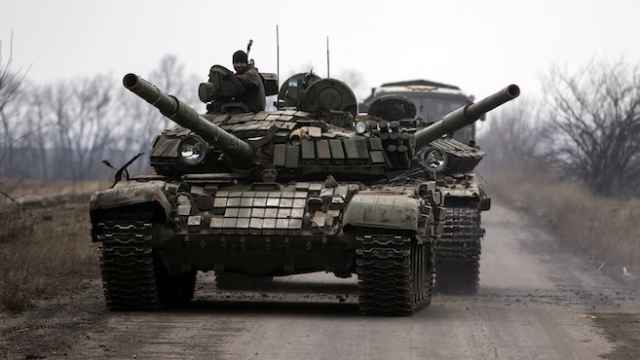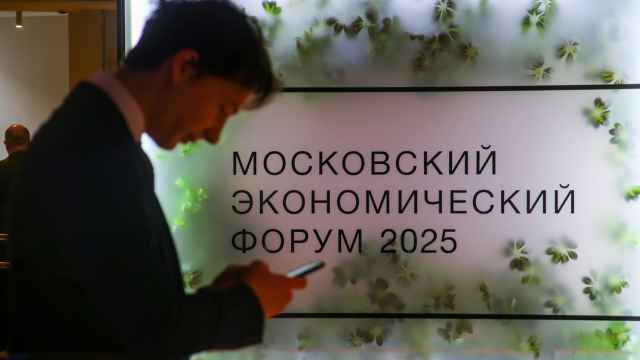A peace plan to end the conflict in eastern Ukraine came under renewed strain on Wednesday, with Ukraine and Russia rowing publicly over the next steps and further Ukrainian military casualties from rebel attacks testing a fragile cease-fire.
Moscow reacted sharply after Ukraine agreed on Tuesday to confer special status on rebel-controlled eastern regions and grant them limited self-rule — but only once local elections had been held under Ukrainian law, something unpalatable for rebel leaders who have proclaimed their own "people's republics."
Russian Foreign Minister Sergei Lavrov said the Ukrainian parliament had sought to "rewrite" the agreement reached in Minsk, Belarus, last month. The Kremlin said the Minsk deal was now further away from being realized than it was a few days ago.
In Kiev, Prime Minister Arseniy Yatsenyuk responded that no one on the Ukrainian side had much optimism that Russia "and the terrorists" would readily fulfil the Minsk plan.
"First and foremost: to comply with the Minsk agreements, the Russian bandits must clear out of the territory of Ukraine and give the possibility to Ukraine of carrying out honest and transparent elections in line with international standards," he said in televised comments at a government meeting.
The row, which could lead the deal into a dead-end, starkly highlighted the different strategies towards the issue of self-rule in the east.
Soldier Killed
Kiev is pushing a decentralization agenda in which it makes concessions aimed at blunting a drive for independence, while Moscow appears to be supporting a push by the rebels for powers that could give them veto over national policy and coming closer to officially recognising the setting-up of the two "people's republics" in Ukraine's east.
The cease-fire struck at the summit of the leaders of Ukraine, Russia, Germany and France in Minsk came under pressure with the Kiev military saying one Ukrainian soldier had been killed in rebel attacks in the past 24 hours and five wounded.
Fighting in a conflict in which more than 6,000 people have been killed has greatly diminished, although huge areas of Ukraine's industrialized east, including the big cities of Donetsk and Luhansk, are under rebel control.
Heavy military equipment has been withdrawn to put the opposing sides out of range of each other's big guns in line with the agreement.
But there is concern in Kiev that Mariupol, a port city of half a million on the Sea of Azov and which is still held by the government, could be a prime target for the Russian-backed rebels should the cease-fire collapse.
Comments by Ukrainian leaders suggest the pro-Western leadership of President Petro Poroshenko steamrollered the law through parliament, not through any real conviction it would be acceptable to the rebels, but to show the West — whose financial and political backing it relies on — it was abiding by the deal.
Western governments, who are backing a $40 billion aid package for Ukraine over four years, regard the Minsk agreement as still the best opportunity for a lasting settlement.
"If [Russian President Vladimir] Putin takes a decision to attack, he will attack regardless of whether we adopt this law or not," parliament vice-speaker Andriy Parubiy said Tuesday before the law was passed.
Kremlin spokesman Dmitry Peskov said: "Judging by the last decision made by the Rada [Ukrainian parliament),] we are today further from realizing the Minsk agreements than we were a few days ago."
A Message from The Moscow Times:
Dear readers,
We are facing unprecedented challenges. Russia's Prosecutor General's Office has designated The Moscow Times as an "undesirable" organization, criminalizing our work and putting our staff at risk of prosecution. This follows our earlier unjust labeling as a "foreign agent."
These actions are direct attempts to silence independent journalism in Russia. The authorities claim our work "discredits the decisions of the Russian leadership." We see things differently: we strive to provide accurate, unbiased reporting on Russia.
We, the journalists of The Moscow Times, refuse to be silenced. But to continue our work, we need your help.
Your support, no matter how small, makes a world of difference. If you can, please support us monthly starting from just $2. It's quick to set up, and every contribution makes a significant impact.
By supporting The Moscow Times, you're defending open, independent journalism in the face of repression. Thank you for standing with us.
Remind me later.





